First time being at The Golden Spoon Award, Thang Loi 1 Restaurant (An Giang province) impressed the jury by fried Mắm (fermented fish) rolls. This year, in both preliminary and semi-final round, they really tickles the jury’s fancy with their bold, even risky creation when they wanted to flourish the rustic dishes from their hometown.
1. It was so memorable seeing the
happiest moment of chef Vo Kim Sang when his team seized a ticket to the final
round of The Golden Spoon 2016. He embraced his colleagues then ran onto the
stage with un-hide-ably happy face. People who used to talk to this
austere-faced chef might be able to understand his extreme reaction because just
one year ago, when the announcement of final teams ended without his team, he
disappointedly stood there with emotional abstinence.
In the semi-final round of The
Golden Spoon 2015, chef Vo Kim Sang and his team arrived at Van Thanh Park (HCM
city) at 4:00am although the contest would not be held in 3 more hours. They
rather anxiously waited there than lying on bed. Chef Sang admitted that they
had had no pressure from their leads but besides learning new knowledge, they
also wanted to improve themselves and to fulfill their own mission - bringing
all their regional specialties to diverse diners.
There was so pity not to go on
the contest but that regretful moment quickly passed. Emphatically, chef Vo Kim
Sang came to shake hands and congratulate winners.
This season, one more time, the
same team had arrived at Ho Chi Minh city early, including chef Vo Kim Sang,
Tran Quoc Tri, and Vuong Thien Toan. With high spirit and comfortable attitude,
they carried their well-prepared regional products to the semi-final round,
such as gamboge fruits, Ca Na fruits (Elaeocarpus), cassava, and duck. Thang Loi 1
Restaurant team has been persistently longing for flourishing their rustic
dishes from home.
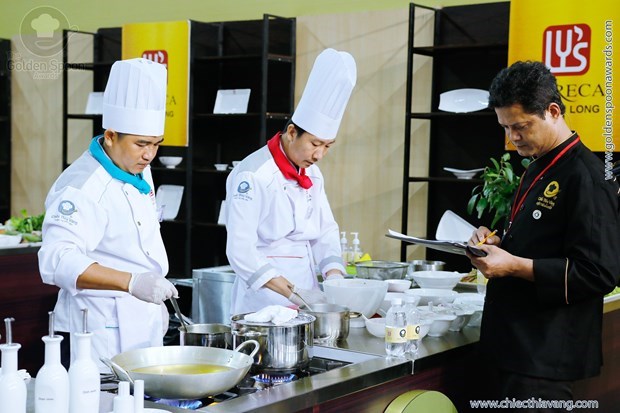
Season 2016, Thang Loi 1 Restaurant’s chefs were much more comfortable and confident with their well-prepared ingredients.
The team picked a risky combination, sour gamboge fruits and acrid Ca
Na fruits. They wanted to use up seasonal products from their homeland.
However, this combination can be really awkward if it was not skillfully
processed. Food expert and professional judge Ly Sanh strictly paid attention
to team no.2 when seeing Ca Na fruits in their kitchen. Following his own
rules, judge Ly Sanh only asked and listened without further explanation. He
had been waiting for the tasting part.
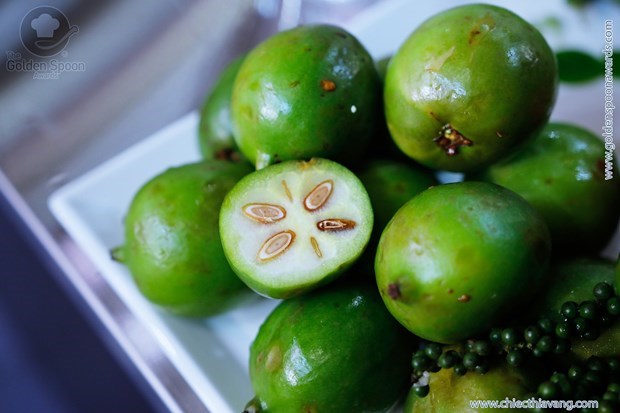
An Giang Gamboge fruits.
Chef Kim Sang was confident
cooking with special ingredients like Nang Hai fish and gamboge fruit sauce.
Nang Hai fish is a type of bronze feather-back fish with black and white dots,
living mostly in Me Kong river system. This fish has flavorful taste, tender
yet chewy texture. After processed and seasoned, Nang Hai fish paste became a
great crunchy and unique dish. Traditionally, the whole cleaned fish, flesh and
bone, would be well chopped to retain more calcium but the chefs had to vary
cooking method in order to bring it up to luxurious party table. In this case,
chef Kim Sang must take all bone out before seasoning fish flesh.
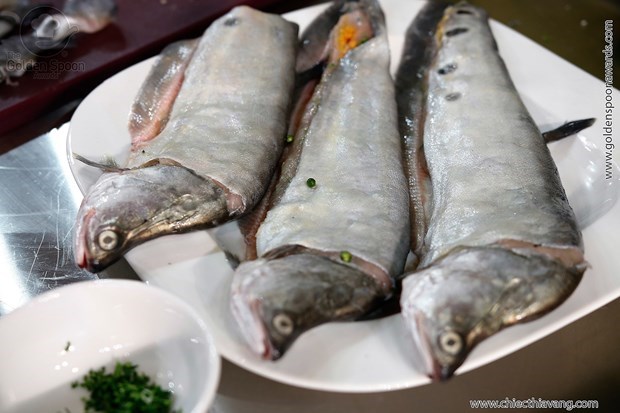
Nang Hai fish or known as bronze feather-back fish.
Spices were another interesting highlight of team no.2. They performed
southwestern generosity by bringing a whole gamboge branch and a basket full of
fruits to decorate their kitchen shelf. Gamboge is a wild fruit with a nice
scent and transparent sour taste. Gamboge shell is quite thick; the core is
divided into segments; each segment has a big seed and thin flesh just like a mangosteen.
Gamboge trees’ habitat is from the Middle to Southwest Vietnam but An Giang gamboge
fruits have oval shape, which is totally different from Middle gamboge.
Recently, scientists have known that gamboge fruits contain a supplement to
help reducing weight. Thang Loi 1 Restaurant decided to give this sweet &
sour fruit a try.
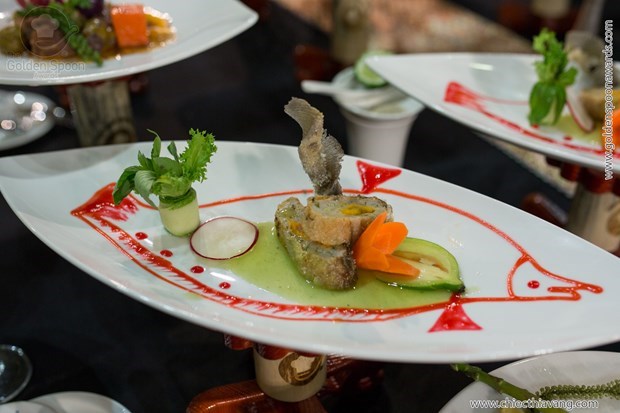
Sautéed Nang Hai fish paste in gamboge sauce.
Boneless Nang Hai fish would be kneaded with seasonings to become chewy
paste then stuffed by a mixture of green onion, Chuc leaves, cilantro, and
salted egg yolk. Gamboge fruits would be taken all seeds out, grinded, seasoned
then cooked with a bit of flour to thicken the sauce. Deep-fried fish paste was
served with impressive gamboge sauce.
2. The next dish was made from duck
meat in floating season: duck breast and Ca Na fruits served with bread. In
floating season, southwestern people have numerous games to play in generous
Mother nature, such as fishing, net casting, catching tiny shrimps in fields,
and swimming. Moreover, they also have interesting seasonal products, like Ca
Na fruits. Ca Na grows on riverbanks and gets really fruity in season. People
can make sweeten candies, pickled, or sweet and sour Ca Na but cooked Ca Na and
duck breast is an exceptional.
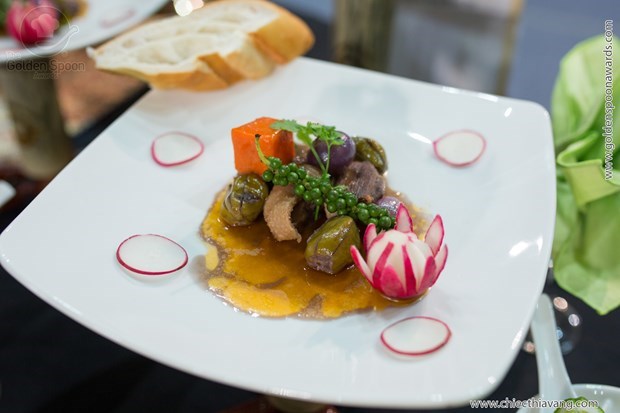
Duck breast and Ca Na fruits served with bread.
According to chefs, Ca Na fruits have a sweet and sour taste and
they’re generally good for health. Duck breast and Ca Na was am appealing
healthy brand new food, which provides high nutrition to diners. The chefs took
time to make it a perfect dish in which duck meat has retained its tender and
juicy taste. After many times of trying, they have fluently memorized this
recipe: Season duck meat with seasonings and Welsh onions in 15 minutes; Quickly
stir-fry duck meat; Pour in broth and boil in 20 minutes then add Ca Na fruits
and carrots, cook until duck meat well-done; Seasonings to taste then add in a
bit flour to thicken. The most important steps are to soak Ca Na fruits in salt
water, to drain out then to blanch them in boiling water again to eliminate the
acridness.
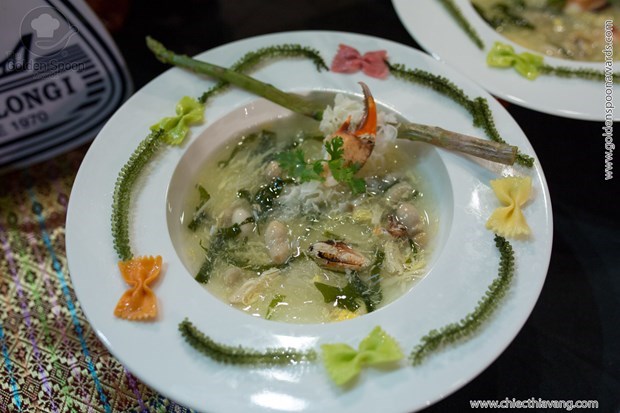
Ngoc Ke and seaweed soup.
The appetizer is another bold choice in picking and mixing ingredients
that called Ngoc Ke and seaweed soup. Ngoc Ke (chicken testicles) is a highly
nutritious food, which contains protein, lipid, and hormones while seaweed is a
healthy choice for body detoxing, cholesterol reducing, and skin protecting
because of its vitamins and minerals.
It might seem irrelevant but the combination was totally intentional.
With chicken eggs, shredded chicken, crabmeat, white fungus, and Enoki
mushroom, the chefs created a super invigorating soup for both men and women.
The process was quite simple: Bring chicken broth with Ngoc Ke, shredded
chicken, white fungus, crabmeat, and Enoki mushroom to boil; Season to taste; Add
seaweed in then add tapioca flour and scrambled eggs.
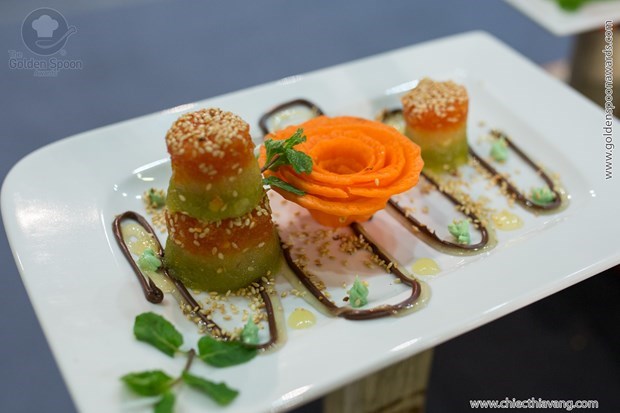
Southwest Cassava Cake.
Southwest Cassava cake was a purely casual dish and the chefs wanted to
keep its rustic characteristic. This was a simple combination of cassava and
green beans, condensed milk, coconut milk, butter, sugar, and Gac fruit
(cochinchin gourd). Peeling raw cassava and grate the flesh; steam green
beans and smash to make paste; ground pandan leaves to get juice; collect Gac
flesh. After preparation, add grated cassava, green bean paste, sugar,
condensed milk, coconut milk, and vanilla then knead the whole dough till
blended. Press dough in cake mold then bake in 60 minutes or until golden
brown.
Judge Ly Sanh just had a small technical comment that fish paste should
be shifted to appetizer and the rest was a big “good” for each dish. Until that
moment, judge Ly Sanh explained why he had throughout asked about Ca Na fruits
“I had asked carefully because I was a bit worried about this dish. From my
own experiences, if it’s not enough skillful, Ca Na fruit will remain the
bitter and acrid taste and spoil the whole dish. But you guys did a good job.”
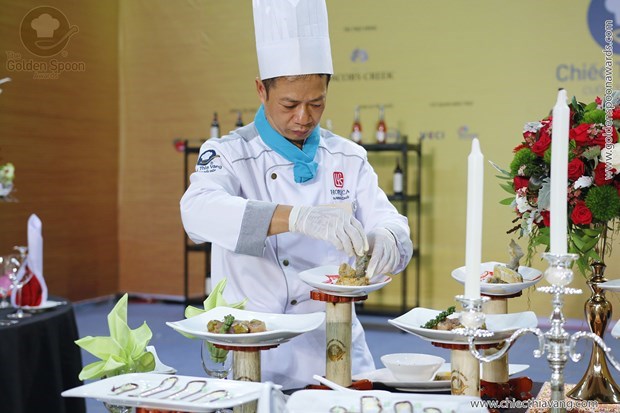
Chef Tran Quoc Tri particularly garnished his dish.
3. Seeing chef Vuong Thien Toan was
so focused on making dessert that forgot the bustling crowd around, chef Tran
Quoc Tri was strongly kneading fish paste but flexibly drawing Nang Hai fish by
chili sauce on white dish, chef Kim Sang quickly finished step by step while
directing his two colleagues, and finally three of them burst into tear when
the team made top 15.
It was so easy to recognize where were passionate and enthusiastic
chefs who wanted to flourish their rustic homeland dishes.
By The Golden Spoon Award